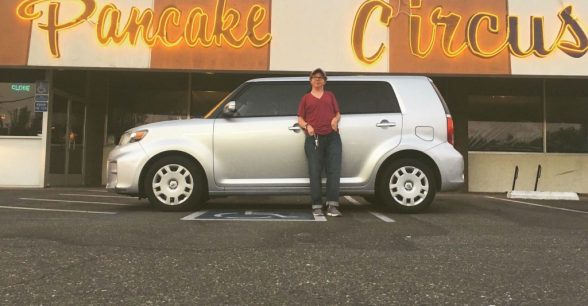Disabled People Have the Right to Raise Children
I didn’t see many families like mine growing up. All my childhood friends’ parents had cars and could drive. My mom was visually impaired and had Ehlers-Danlos syndrome. She was the first person to teach me that I shouldn’t be ashamed of being disabled, and she almost lost her parental rights as a result.
Disabled parents often face issues of parental rights, such as the right to raise children, whether those kids are biological or adopted. Current research estimates there are 4.1 million parents with disabilities in the United States. Parents with disabilities are at risk of having their children removed from them, and removal rates are as high as 70-80% for psychiatric disability and 40-80% for intellectual disability, with 13% of parents with physical disabilities reporting discrimination in their custody cases.
Heather Watkins is a parent who has muscular dystrophy, and she serves on the advisory board of National Research Center for Parents with Disabilities. “Disabled people should have the right to raise children,” she proclaims.
While many would jump to the conclusion that disabled parents aren’t equipped to raise children, there are so many benefits to growing up with a disabled parent.
Katie Tastrom, a disability lawyer who is a disabled parent herself believes that disabled parents teach their kids to be more adaptive. “The main thing that I think is different due to my disabilities is that [my kids] do more things for themselves than they would have otherwise, such as laundry and cooking (age appropriate of course),” she says. “It has actually worked out well because they have a lot of skills for independence that they would not otherwise have.”
When I was growing up, my mom and I walked to the grocery store because she couldn’t drive, and she taught me how to set reminders on my phone so I wouldn’t miss appointments or forget to do my homework. Children of disabled parents get an early introduction to life skills, whether it’s learning how to do something differently or becoming more self-sufficient.
Because both my mom and I were disabled, I became independent by helping her with household tasks like doing the dishes, and she taught me how to adapt to my environment. I couldn’t go outside in cold weather for as long as my friends could due to the side effects of Raynaud’s syndrome, and she modeled dressing in warm layers and taking breaks to go inside to show me how she survived New England winters.
Many families without any disabled family members tend to think of neurotypical and able-bodied as the norm for parenting. “I believe we need to see more disabled parenting across the media landscape so it becomes part of the collective consciousness,” says Watkins. “We need to show family dynamics and how disability adds dimension to parenting, benefit from having disabled parent(s) and how adaptive, out-of-the box thinkers many disabled parents are.”
In addition to struggling to get or retain parental rights at all, disabled parents also face the inability to make choices about how they parent their kids. My mom faced this when she was raising me, because many educators wanted her to place me in Applied Behavioral Analysis (ABA) therapy and teach me to reduce or eliminate some of my autistic behaviors, such as stimming by rocking my feet and flapping my hands. My mom refused to do this because she saw how painful it was for me not to stim, especially when I was brainstorming for school assignments or the creative projects I did for fun.
ABA therapy has since become controversial, especially among autistic self-advocates, but at the time, my mom’s ability to parent was called into question because of her refusal. After home visits with a social worker, she was ultimately found completely fit to take care of me, but the experience was traumatizing for both of us. She wanted the ability to make the choice she thought was best for me, which is something that non-disabled parents are automatically entitled to.
Instead of taking away disabled parents’ rights, we need to make sure disabled parents have access to the resources they need to parent effectively.
Disabled parents frequently rely on their own expertise on access and accommodations. For instance, Lisa Goldstein installed her own video monitors when her kids were younger with flashing lights to indicate when they cried, and taught her children from the beginning to face her when they speak. My mom walked me to and from school when I was too young to walk alone or with friends, and she and I would take breaks when we went on long walks for fun or with a purpose. It would be great if parents were given access to resources to make parenting even easier, though.
Disabled parents shouldn’t be shamed or worried about losing their parental rights when they ask for help. My mom didn’t have money for frequent taxi rides when she was raising me, but it would have been great if an educator or a disability organization could have connected her with information about paratransit options or public transportation discounts for people with disabilities.
Heather Watkins suggests that disabled parents should have adequate support systems that include other disabled parents. These kind of groups would allow disabled parents to swap stories, share best practices and tips, offer advice and recommendations, and share frustrations the way non-disabled parents do with one another.
Disabled parents have just as much to offer their children as non-disabled parents do, and we need to create societal support for accessibility and accommodations so that all parents have access to the necessary resources for their children.
About Rooted In Rights
Rooted in Rights exists to amplify the perspectives of the disability community. Blog posts and storyteller videos that we publish and content we re-share on social media do not necessarily reflect the opinions or values of Rooted in Rights nor indicate an endorsement of a program or service by Rooted in Rights. We respect and aim to reflect the diversity of opinions and experiences of the disability community. Rooted in Rights seeks to highlight discussions, not direct them. Learn more about Rooted In Rights




Great piece. Disabled parents offer their own unique strengths. Join us at the Disabled Parentinf Project to connect to other parents with disabilities, swap stories/ideas, etc. (disabledparenting.com)
I find that people with disabilities are far more adaptable than their able-bodied counterparts. For many, the easy way is not an option so they are constantly having to find workarounds. Our paths are strewn with obstacles that aren’t there for others so we constantly have to figure out “I can’t do it the way everyone else is doing it but what can I do? I can go over, under or around.” This increases creative thinking and problem solving skills from early in life. Obstacles are a normal experience for people with disabilities, not the exception. This actually means they have far better coping skills than many able-bodies people.
Just imagine the possibilities if people with disabilities were also able to access resources, as Alaina Leary says. Being resourceful doesn’t absolve the able-bodied of the need to increase access to resources for others. Increasing accessibility helps everyone after all.